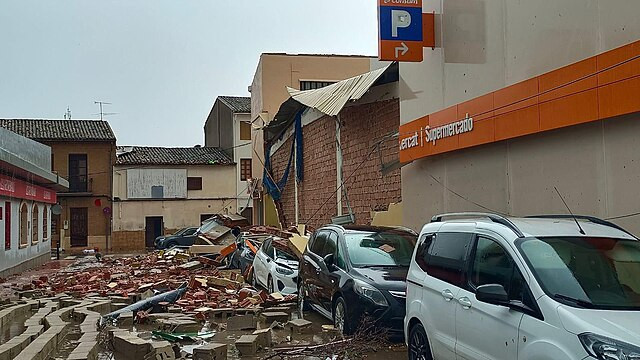Spain is grappling with one of its worst natural disasters in recent history after torrential rains unleashed devastating floods that killed at least 95 people and left many stranded or unaccounted for in the eastern Valencia region. This unexpected deluge began late Tuesday, transforming roads into rivers and tearing through towns with a force that upended vehicles, uprooted trees, and left communities struggling for survival. Spanish authorities fear that the death toll could rise as rescue teams continue operations.
Over the course of just eight hours, Valencia received more rainfall than it typically experiences in an entire year. In some areas, the rapid deluge swelled rivers to dangerous levels, bursting their banks and flooding homes. Spanish Defense Minister Margarita Robles stated that nearly 1,000 soldiers had been deployed for rescue efforts, attempting to reach those stranded in remote areas while also recovering bodies from wrecked vehicles. "We are searching house by house," said ángel Martínez, head of a military rescue unit, as efforts continued in Utiel, a town with significant loss of life.
In addition to human casualties, the flooding has rendered essential infrastructure unusable. Highways, rail lines, and local transit services in Valencia remain largely inoperable, with government officials estimating it will take days, if not weeks, to restore service fully. Valencia's high-speed rail line connecting to Madrid has been halted, leaving parts of the region isolated. Schools, libraries, and other public institutions were also shuttered as emergency teams attempted to restore essential services to thousands left without electricity or clean water.
Residents in the hardest-hit areas recounted terrifying scenes of survival amid the flooding. In the Valencia suburb of Barrio de la Torre, cars were piled atop one another and buildings were half-buried in mud. Christian Viena, a local bar owner, described the wreckage to the Associated Press: "The neighborhood is destroyed. All the cars are on top of each other; it's literally smashed up." In another incident, a couple was rescued from their second-floor home by a construction vehicle after rising waters trapped them inside.
The scale of the rainfall in Valencia was extraordinary, even for a region known for autumn storms. The European Severe Weather Database reported that Chiva, a town east of Valencia, saw more than 320 millimeters (over 12 inches) of rain in just four hours-more than four times Valencia's average for the entire month of October. Emergency alerts were sent, urging residents to seek higher ground, yet many reported receiving these warnings too late to evacuate. Hydrology expert Hannah Cloke criticized the delay, saying, "The tragedy of people dying in cars and being swept away in streets is entirely avoidable if people can be kept away from rising floodwater."
Spain's Prime Minister Pedro Sánchez visited the devastated region on Thursday, marking the first of three official days of mourning. He pledged government support for the victims and urged residents to exercise caution as further rain was forecasted in surrounding areas. "The damage continues, and the priority is to save as many lives as possible," Sánchez stated, adding that his administration would direct resources toward recovery efforts.
The factors behind the catastrophic flooding appear to be tied to both meteorological phenomena and climate change. A "gota fría," or "cold drop" event-a pocket of cold air that detaches from the jet stream and leads to massive downpours-was responsible for this week's rainfall. Climate scientists warn that global warming, fueled by fossil fuel emissions, intensifies such storms. Hotter ocean waters, like those in the Mediterranean, can produce stronger, moisture-rich storm systems. Ernesto Rodríguez Camino, a senior meteorologist with Spain's Meteorological Association, noted, "These types of intense and exceptional rainfall events are going to become more frequent and more intense, and therefore, more destructive."
The disaster has reignited discussions about Spain's emergency response systems. Many people, caught off guard by the storm, took to social media to express frustration over late or missing emergency notifications. Spain's Securities and Emergencies Department acknowledged that emergency alerts went out, but some residents claim they received the messages only once the flooding was underway.
Comparisons are being drawn to other deadly floods in Europe, including Germany and Belgium's 2021 disaster, which claimed over 230 lives. While Spain has experienced severe autumnal storms before, recent years have brought no parallel to the devastation inflicted this week. The last comparable event in Spain was in 1996, when flooding in the Pyrenees killed 87 people. In this week's case, many residents felt trapped as rivers surged rapidly through neighborhoods and the response system struggled to keep pace.






